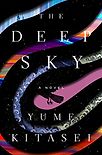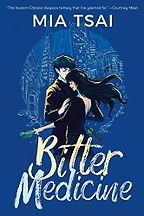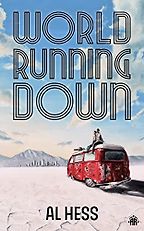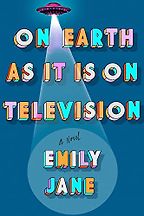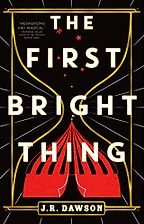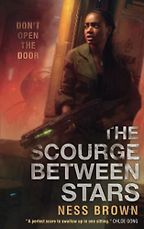How did you become interested in science fiction and fantasy debuts?
I’m a science fiction and fantasy debut author, so that is probably the natural starting point. There are online groups where debut authors can find community, moral support, and guidance about what to expect as they move forward. I joined several Slack groups: one for BIPOC SFF authors; one for traditionally published authors with a debut book coming out in 2023; and one for 2023 science fiction debuts. Those have been wonderful resources.
Also, as I was entering my debut year, I learned about NetGalley for the first time, because advance reader (ARC) copies of my book were being offered there. I discovered that it’s relatively easy to access advance review copies of books. Perhaps as a coping mechanism for my own anxiety, I began requesting other people’s books. I ended up accumulating a pile of delicious ARCs, including science fiction, fantasy, literary, romance, and horror debuts, and I’ve been working my way through them.
Your first recommendation for us is Bitter Medicine by Mia Tsai. Can you tell us a little about this book?
This is a contemporary fantasy set in California, New York, France, and many other places. It’s a fun paranormal adventure story that contains a very sweet romance.
The main character is a woman who has given up her powers and gone into hiding to take care of her elder brother and protect him from their younger brother. She’s been making herself smaller: she has extraordinary abilities but chooses to do something mundane for a living to preserve their cover identities. As the book unfolds, this all starts to unravel and she is forced to confront the past.
It’s really fun. The magic system in the novel is based on Chinese calligraphy. Tsai has built a very rich world. She is multilingual and made a cool choice not to translate any of the other languages (Chinese and French) in this book – you can understand a lot through context, even though there’s no translation. It works really well.
That sounds great. You mentioned the protagonist is a woman with extraordinary powers who must make herself smaller. Do you think SFF is particularly effective at portraying the struggles we face in everyday life?
That’s exactly why I love SFF. You can play with the parameters of the normal world in a way that allows you to ask questions about everyday issues, and to conduct thought experiments that crack open what is at the heart of those issues. You can play with symbolism in interesting ways because you can completely change the context.
At heart, most SFF stories are human stories about people in extraordinary circumstances making choices that you or I might make. It’s a way of getting to the bone of what makes people human.
The next book you’ve chosen for us is World Running Down by Al Hess. Can you introduce us to this book?
This is a science fiction story set in dystopian Utah. A salvager named Valentine is trying to raise enough money to gain citizenship to Salt Lake City, where he will be able to get gender-affirming surgery (he’s trans).
Salt Lake City is the utopia of this world, and everybody else lives in the desert beyond it, scrabbling for scraps. Inside Salt Lake City, residents have free healthcare, housing, food, and comfort; outside it, people live in a very desperate state.
Valentine takes a job with Osric, an AI trapped in an android body. And, of course, they fall in love along the way! The problem is, Val starts to realizes this job is not what it seems, and he has to choose whether he’ll sacrifice his principles to get what he wants – or give up his own dreams to help others.
An AI trapped in an android body, you say?
Yes, all these little city-states are run by super-smart AIs. There’s an interesting government structure between the AIs and the people who are leading the city-state. This book takes a neutral view of AIs in terms of morality – they’re not unlike people, except they’re much smarter.
And then there are androids, which are not supposed to be sentient. So when Osric, an AI, is forced into an android body, he is very upset – it’s a poignant parallel to Val, who is struggling with his own dysphoria. It’s an example of how SFF can be used to tell human stories that are true to the contemporary world.
Your next selection for us is On Earth as It Is on Television by Emily Jane. Tell us why you recommend this science fiction debut novel.
I was introduced to Douglas Adams at nerd camp when I was twelve. He blew my mind. His writing is so funny and there are moments of real heart, but it’s also just a good time and doesn’t take itself too seriously.
This book is the closest to Douglas Adams I’ve read in a long time. It intentionally leans into the nostalgia of campy sci-fi and combines that with really beautiful language and captivating storytelling. It comes together as an interesting combination of what I would characterize as speculative literary fiction and straight-up science fiction. It’s hilarious, moving, and very well done.
The story is set in today’s world. Aliens arrive in giant ships that hover over all the major cities for a couple of days, and then they leave. These events plunge the whole world into an existential crisis, like: ‘Were we not cool enough to be invited to that party?’
It has an ensemble cast, and the story follows each character as they deal with the aftermath of the departure. There are a lot of cats in it, some of who can now communicate telepathically!
This sounds really fun; my cat would be delighted. The next recommendation you have for us is The First Bright Thing by JR Dawson, a fantasy debut. What did you enjoy about this book?
The First Bright Thing is a fantasy novel about magical circuses and found family. It’s been compared with The Night Circus, and I can see why, but the vibes are different. It’s a historical fantasy set in America during the Roaring Twenties, with a time travel element.
It’s about a circus in which everyone has a magical ability that’s called a spark. They use their powers to put on performances that can change a person’s life right at the moment they need it.
“At heart, most SFF stories are human stories”
One of the performers has the ability to see the future, and glimpses the Holocaust and World War Two looming ahead. They want to use their powers to prevent it from happening. They’re also on the run from the Circus King, who is obsessed with the Ringmaster and has his own terrible circus that goes around terrifying people.
It’s a beautiful story about people using their abilities to work together to make a better world. I’m a sucker for that.
The last book you recommended for us is Ness Brown’s The Scourge Between Stars. Can you tell us more about this science fiction horror debut?
I’m a scaredy cat. I don’t watch a lot of science fiction horror, but I like reading it. I can’t square that circle for you. I like reading scary books, as long as it’s not late at night.
This book has been compared to Alien, and I think it’s a good comparison. It’s about a woman named Jack Albright, who is the first mate on a doomed generation ship. They traveled all the way to another planet, but it’s not hospitable. So, after all that, they’ve decided to turn around and come back to Earth, but now their old ships are falling apart.
Five Books interviews are expensive to produce. If you're enjoying this interview, please support us by donating a small amount.
Jack’s father is the captain, but he hasn’t come out of his room in weeks for some unknown reason, so she’s left in charge. And then all of a sudden, stuff starts happening. She hears knocking on the ship’s walls. They get choppy messages from other ships in the flotilla, saying: ‘Don’t open the door to the outside!’
Of course, someone does.
It sounds great, but I’m not sure I have the stomach for it!
It’s a very fast read. You tear through it. Very gory.
I’ll be sure to save it for a sunny mid-day. Finally, you mentioned you have an upcoming science fiction debut of your own, The Deep Sky. Can you tell us a little more about your novel?
Yes! The Deep Sky is a feminist sci-fi thriller about an interstellar voyage that is knocked off course by an explosion. The ship is already halfway to another planet, and the crew begins to turn against each other as they try to figure out what has happened. What caused the explosion? Who did it? Who wants to sabotage the mission?
I say it’s a feminist space thriller because it’s the inverse of a lot of old science fiction. The entire crew of the Phoenix is selected for their ability to give birth, so there are no cis men on board.
The main character is biracial, so the story delves into impostor syndrome, feeling like you’re not enough, and wanting to find meaning in your life.
I wrote it during the pandemic when I was feeling big feelings. I joke that in the first draft of this book, there was somebody bursting into tears in every single chapter. It was an outlet into which I channeled all the rage and the helplessness of 2020. But it’s fundamentally a hopeful book about trying to achieve something better for the next generation.
Interview by Uri Bram
July 11, 2023. Updated: November 24, 2023
Five Books aims to keep its book recommendations and interviews up to date. If you are the interviewee and would like to update your choice of books (or even just what you say about them) please email us at [email protected]

